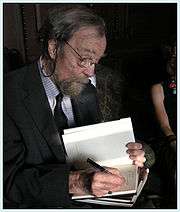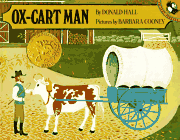Donald Hall
| Donald Hall | |
|---|---|
 | |
| Born |
September 20, 1928 Hamden, Connecticut, US |
| Occupation | Poet, writer, editor, critic. |
| Nationality | United States |
| Period | 1950–present |
| Genre | poetry, essays, children's literature, memoirs, biography |
| Notable awards | Robert Frost Medal (1991) |
| Spouse |
Kirby Thompson (m. 1952–67) Jane Kenyon (m. 1972; d. 1995) |
| Children |
Andrew Philippa |
Donald Andrew Hall, Jr.[1] (born September 20, 1928), known as Donald Hall, is an American poet, writer, editor and literary critic.
Background
Hall is a graduate of Phillips Exeter Academy, Harvard, and Oxford. Hall is the author of over 50 books across several genres from children's literature, biography, memoir, essays, and including 22 volumes of verse. Regarded as a "plainspoken, rural poet," Hall's work "explores the longing for a more bucolic past and reflects the poet's abiding reverence for nature."[2] Early in his career, he became the first poetry editor of The Paris Review (1953–1961), a prominent quarterly literary journal, and was noted for interviewing poets and other authors on their craft. Hall is respected for his work as an academic, having taught at Stanford University, Bennington College and the University of Michigan, who has made significant contributions to the study and craft of writing.
On June 14, 2006, Hall was appointed as the Library of Congress's 14th Poet Laureate Consultant in Poetry (commonly known as "Poet Laureate of the United States").[3] Hall served as poet laureate for one year.
Life and career
Early life and education
Hall was born in Hamden, Connecticut, the only child of Donald Andrew Hall, a businessman, and Lucy Wells. He was educated at Phillips Exeter Academy, then earned a bachelor's degree from Harvard in 1951 and a B.Litt, from Oxford in 1953. Hall received an honorary PhD, Lit. from Bates College in 1991.
Hall began writing even before reaching his teens, beginning with poems and short stories, and then moving on to novels and dramatic verse. Hall continued to write throughout his prep school years at Exeter, and, while still only sixteen years old, attended the Bread Loaf Writers' Conference, where he made his first acquaintance with the poet Robert Frost. That same year, he published his first work. While an undergraduate at Harvard, Hall served on the editorial board of The Harvard Advocate, and got to know a number of people who, like him, were poised with significant ambitions in the literary world, amongst them John Ashbery, Robert Bly, Kenneth Koch, Frank O'Hara, and Adrienne Rich. During his senior year, he won the Glascock Prize that Koch had won 3 years earlier.
After leaving Harvard, Hall went to Oxford for two years, to study for the B.Litt. He was editor of the magazine Oxford Poetry, as literary editor of Isis, as editor of New Poems, and as poetry editor of The Paris Review. At the end of his first Oxford year, Hall also won the university's Newdigate Prize, awarded for his long poem, 'Exile'. In September, 1952, he married his first wife, Kirby Thompson, with whom he had his son and daughter.[4]
On returning to the United States, Hall went to Stanford, where he spent one year as a Creative Writing Fellow, studying under the poet-critic, Yvor Winters. Following his year at Stanford, Hall went back to Harvard, where he spent three years in the Society of Fellows. During that time, he put together his first book, Exiles and Marriages. In 1957, with Robert Pack and Louis Simpson, he edited an anthology which was to make a significant impression on both sides of the Atlantic, New Poets of England and America. It was later juxtaposed with Donald Allen's The New American Poetry 1945–1960. In 1968, he signed the "Writers and Editors War Tax Protest" pledge, vowing to refuse tax payments in protest against the Vietnam War.[5]
While teaching at the University of Michigan in Ann Arbor, Michigan he met poet Jane Kenyon, whom he married in 1972. Three years after they were wed, they moved to Eagle Pond Farm, his grandparents' former home in Wilmot, New Hampshire. Hall and Kenyon were profiled at their home in a 1993 PBS documentary, "A Life Together," which aired as an episode of "The Bill Moyers Journal."In 1989, when Hall was in his early sixties, it was discovered that he had colon cancer. Surgery followed, but by 1992 the cancer had metastasized to his liver. After another operation, and chemotherapy, he went into remission, though he was told that he only had a one-in-three chance of surviving the next five years. Then, early in 1994, it was discovered that Kenyon had leukemia. Her illness, her death fifteen months later, and Hall's struggle to come to terms with these things, were the subject of his 1998 book, Without. Another book of poems dedicated to Kenyon, Painted Bed, is cited by Publishers Weekly as "more controlled, more varied and more powerful, this taut follow-up volume reexamines Hall's grief while exploring the life he has made since. The book's first poem, 'Kill the Day,' stands among the best Hall has ever written. It examines mourning in 16 long-lined stanzas, alternating catalogue with aphorism, understatement with keened lament: 'How many times will he die in his own lifetime?'
Hall served as a member of the editorial board for poetry at the Wesleyan University Press from 1958 to 1964.[6] He has been closely affiliated with the Bennington College's graduate writing program since 1994, giving lectures and readings annually.
Career

To date, Hall has published fifteen books of poetry, most recently White Apples and the Taste of Stone (2006), The Painted Bed (2002) and Without: Poems (1998), which was published on the third anniversary of Jane Kenyon's death. Most of the poems in Without deal with Kenyon's illness and death, and many are epistolary poems. In addition to poetry, he has also written several collections of essays (among them Life Work and String Too Short to be Saved), children's books (notably Ox-Cart Man, which won the Caldecott Medal), and a number of plays. His recurring themes include New England rural living, baseball, and how work conveys meaning to ordinary life. He is regarded as a master both of received forms and free verse, and a champion of the art of revision, for whom writing is a craft, not merely a mode of self-expression. Hall has won many awards, including two Guggenheim Fellowships and a Robert Frost Medal, and has served as poet laureate of his state. He continues to live and work at Eagle Pond Farm.
When not working on poems, he has turned his hand to reviews, criticism, textbooks, sports journalism, memoirs, biographies, children's stories, and plays. He has also devoted a lot of time to editing: between 1983 and 1996 he oversaw publication of more than sixty titles for the University of Michigan Press alone. He was for five years Poet Laureate of his home state, New Hampshire (1984–89), and can list among the many other honours and awards to have come his way: the Lamont Poetry Prize for Exiles and Marriages (1955), the Edna St Vincent Millay Award (1956), two Guggenheim Fellowships (1963–64, 1972–73), inclusion on the Horn Book Honour List (1986), the Sarah Josepha Hale Award (1983), the Lenore Marshall Poetry Prize (1987), the National Book Critics Circle Award for Poetry (1988), the NBCC Award (1989), the Los Angeles Times Book Prize in poetry (1989), and the Frost Medal (1990). He has been nominated for the National Book Award on three separate occasions (1956, 1979 and 1993). In 1994, he received the Ruth Lilly Poetry Prize for his lifetime achievement.
Hall was named the fourteenth U.S. Poet Laureate, succeeding Ted Kooser.[7] He served from October 1, 2006, and was succeeded by Charles Simic the following year.[8] At the time of his appointment, Hall was profiled in episode of The News Hour with Jim Lehrer that aired on October 16, 2006. Hall was awarded the 2010 National Medal of Arts by President Barack Obama.[9]
Personal life
Donald Hall currently resides at Eagle Pond Farm in Wilmot, New Hampshire, a small town in Merrimack County in the vicinity of where the late poet and author Jane Kenyon (1947–1995) lived.
Awards and honors
- 1952: Newdigate Prize
- 1955: Lamont Poetry Prize, for Exiles and Marriages
- 1956: Edna St Vincent Millay Award
- 1956: Nomination for the National Book Award
- 1963–1964: Guggenheim Fellowship
- 1972–1973: Guggenheim Fellowship
- 1979: Caldecott Medal, for Ox-Cart Man
- 1979: Nomination for the National Book Award
- 1984–1989: Poet Laureate of New Hampshire
- 1983: Sarah Josepha Hale Award
- 1986: Horn Book Honour List
- 1987: Lenore Marshall Poetry Prize
- 1988: National Book Critics Circle Award for Poetry
- 1989: Los Angeles Times Book Prize in poetry
- 1990: Robert Frost Medal from the Poetry Society of America
- 1991: Honorary Doctor of Letters (in honoris causa) from Bates College.
- 1993: Nomination for the National Book Award
- 1994: Ruth Lilly Poetry Prize for his lifetime achievement.
- 1999: L.L. Winship/PEN New England Award for Without: Poems
- 2006–2007: Fourteenth U.S. Poet Laureate
- 2010: National Medal of Arts[10]
Bibliography
Poetry
Essays
Biography
|
Drama
For children
Short stories
Memoirs
Textbooks
|
References
Notes
- 1 2 Full titles imply a biographical memoir covering four poets, expanded to cover seven.
• Remembering Poets: Reminiscences and Opinions: Dylan Thomas, Robert Frost, T. S. Eliot, Ezra Pound
• Their ancient glittering eyes: remembering poets and more poets : Robert Frost, Dylan Thomas, T.S. Eliot, Archibald MacLeish, Yvor Winters, Marianne Moore, Ezra Pound
References
- ↑ McDowell, Robert. "Hall, Donald (Andrew, Jr.)" (entry) in Contemporary Poets (Thomson Learning, 2001).
- ↑ Poetry Foundation (Chicago, Illinois). Biography: Donald Hall (found online here) (Retrieved November 20, 2012).
- ↑ "Poet Laureate Timeline: 2001–present". Library of Congress. 2009. Retrieved 2009-01-01.
- ↑ "One Road" (March 1, 2013). https://theamericanscholar.org/one-road
- ↑ "Writers and Editors War Tax Protest" January 30, 1968 New York Post
- ↑ http://waywiser-press.com/imprints/seven.html
- ↑ Wang, Beverley (June 14, 2006). "Donald Hall named nation's poet laureate". Associated Press.
- ↑ Rich, Motoko (August 2, 2007). "Charles Simic, Surrealist With Dark View, Is Named Poet Laureate". New York Times.
- ↑ http://www.whitehouse.gov/the-press-office/2011/03/01/president-obama-award-2010-national-medal-arts-and-national-humanities-m
- ↑ Lifetime Honors – National Medal of Arts
External links
| Wikiquote has quotations related to: Donald Hall |
- Between Solitude and Loneliness by Donald Hall, New Yorker, October 15, 2016
- Resources on Donald Hall from the Library of Congress
- Donald Hall's page at Poets.org
- "Donald Hall, Poet Laureate of the United States, talks with Robert Birnbaum" on Identity Theory website, posted December 18, 2006
- Donald Hall, an interview with Pat Gage and Caitlin McKenna. Narrative Magazine (Spring 2010).
- Judith Moore interviews Donald Hall
- Flying Revision's Flag: Martin Lammon interviews Donald Hall
- The Impossible Marriage by Donald Hall at the Oxford University Press blog
- Donald Hall tells his life story at Web of Stories
- Peter A. Stitt (Fall 1991). "Donald Hall, The Art of Poetry No. 43". The Paris Review.
- Watch Donald Hall read "Self-Portrait as a Bear" at Open-Door Poetry
- Reading by Donald Hall of some of his poetry
- Early drafts of ox-cart man